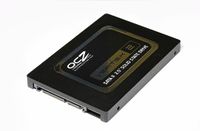We are still actively working on the spam issue.
Difference between revisions of "Solid State Drives"
(what to store on an ssd, encryption warning) |
m (honed sanitization link) |
||
| Line 5: | Line 5: | ||
Generally, instead of being used to store all of a user's data, solid state drives are used to store the operating system, while a hard drive is used to store additional data. Files which require frequent loading (e.g. commonly used applications/games) are best suited to an SSD, whereas ocasionally accessed files (e.g. your pirated movie collection) will just waste the precious SSD space. Solid state drives that hold the 200-500GB range tend to be more stable than the 500GB and up models. | Generally, instead of being used to store all of a user's data, solid state drives are used to store the operating system, while a hard drive is used to store additional data. Files which require frequent loading (e.g. commonly used applications/games) are best suited to an SSD, whereas ocasionally accessed files (e.g. your pirated movie collection) will just waste the precious SSD space. Solid state drives that hold the 200-500GB range tend to be more stable than the 500GB and up models. | ||
| − | [[Encryption]] and [[Data Destruction | sanitization]] is an issue on SSDs as operating systems can never be certain where their data is being written to. The firmware on SSD drives includes wear levelling, which both extends the life of the drive and abstracts the physical location of any data stored. | + | [[Encryption]] and [[Data Destruction#SSD Drives | sanitization]] is an issue on SSDs as operating systems can never be certain where their data is being written to. The firmware on SSD drives includes wear levelling, which both extends the life of the drive and abstracts the physical location of any data stored. |
[[Category:Hardware]] | [[Category:Hardware]] | ||
[[Category:Terms]] | [[Category:Terms]] | ||
Revision as of 14:15, 27 February 2016
A Solid State Drive (often abbreviated SSD) is a data storing device that stores data via flash memory as opposed to a hard drive, which uses a physical spinning disc. They can be found in both desktops and laptops. They have recently risen in popularity due to their rapid loading times. However, they are still pretty new, and because of this they are more susceptible to failures and problems than the tried and tested hard drives.
Generally, instead of being used to store all of a user's data, solid state drives are used to store the operating system, while a hard drive is used to store additional data. Files which require frequent loading (e.g. commonly used applications/games) are best suited to an SSD, whereas ocasionally accessed files (e.g. your pirated movie collection) will just waste the precious SSD space. Solid state drives that hold the 200-500GB range tend to be more stable than the 500GB and up models.
Encryption and sanitization is an issue on SSDs as operating systems can never be certain where their data is being written to. The firmware on SSD drives includes wear levelling, which both extends the life of the drive and abstracts the physical location of any data stored.
